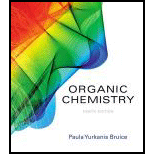
Concept explainers
(a)
Interpretation:
To propose a mechanism for the reaction of acetic anhydride with water and alcohol.
Concept introduction:
The reaction of acetic anhydride with water is a nucleophilic substitution reaction. The nucleophile from the reagent attacks the carbonyl carbon in acetic anhydride to form a tetrahedral intermediate. The carboxylate ion leaves the intermediate leading to the collapse of the tetrahedral intermediate to form the corresponding product.
(b)
Interpretation:
To propose a mechanism for the reaction of acetic anhydride with water and alcohol.
Concept introduction:
The reaction of acetic anhydride with water is a nucleophilic substitution reaction. The nucleophile from the reagent attacks the carbonyl carbon in acetic anhydride to form a tetrahedral intermediate. The carboxylate ion leaves the intermediate leading to the collapse of the tetrahedral intermediate to form the corresponding product.
Trending nowThis is a popular solution!

Chapter 15 Solutions
Organic Chemistry (8th Edition)
- Show how you might use the Williamson ether synthesis to prepare each ether. (a) (b)arrow_forwardI don’t get how to get the last one. I don’t use too many complicated reagents. But I have no idea how to do this. (B) onlyarrow_forwardCan you explain how they got the minor product, show the movement of electrons etc.arrow_forward
- The reaction of a nitrile with an alcohol in the presence of a strong acid forms an N-substituted amide. This reaction, known as the Ritter reaction, doesnot work with primary alcohols. a. Why does the Ritter reaction not work with primary alcohols? b. Provide an explanation for why an amide is less susceptible to nucleophilic attack than its corresponding ester.arrow_forwardPropose a stepwise mechanism for this reaction. The bicarbonate ion will act as a base in the reaction.arrow_forwardDraw a stepwise mechanism for the following reaction. This reaction combines two processes together: the opening of an epoxide ring with a nucleophile and the addition of an electrophile to a carbon–carbon double bond. (Hint: Begin the mechanism by protonating the epoxide ring.)arrow_forward
- Draw a stepwise mechanism for the following reaction. This reaction combines two processes: the opening of an epoxide ring with a nucleophile and the addition of an electrophile to a carbon–carbon double bond. (Hint: Begin the mechanism by protonating the epoxide ring.)arrow_forwardAlso, kindly explain the process of identifying reagents?arrow_forwardPropose a mechanism for the reaction of acetic anhydride with water. a. How does this mechanism differ from the mechanism for the reaction of acetic anhydride with an alcohol?arrow_forward
 Organic Chemistry: A Guided InquiryChemistryISBN:9780618974122Author:Andrei StraumanisPublisher:Cengage Learning
Organic Chemistry: A Guided InquiryChemistryISBN:9780618974122Author:Andrei StraumanisPublisher:Cengage Learning Organic ChemistryChemistryISBN:9781305580350Author:William H. Brown, Brent L. Iverson, Eric Anslyn, Christopher S. FootePublisher:Cengage Learning
Organic ChemistryChemistryISBN:9781305580350Author:William H. Brown, Brent L. Iverson, Eric Anslyn, Christopher S. FootePublisher:Cengage Learning

